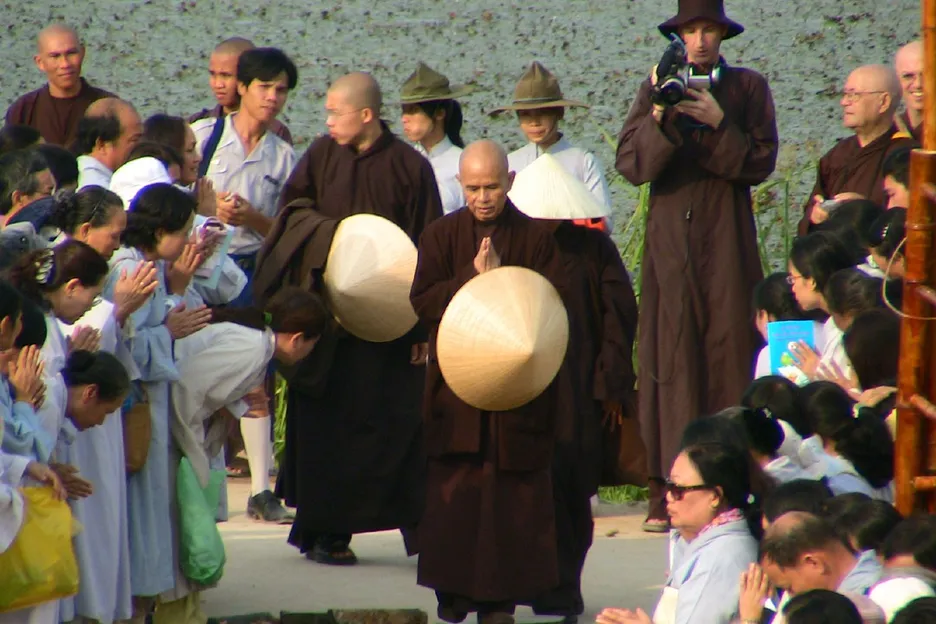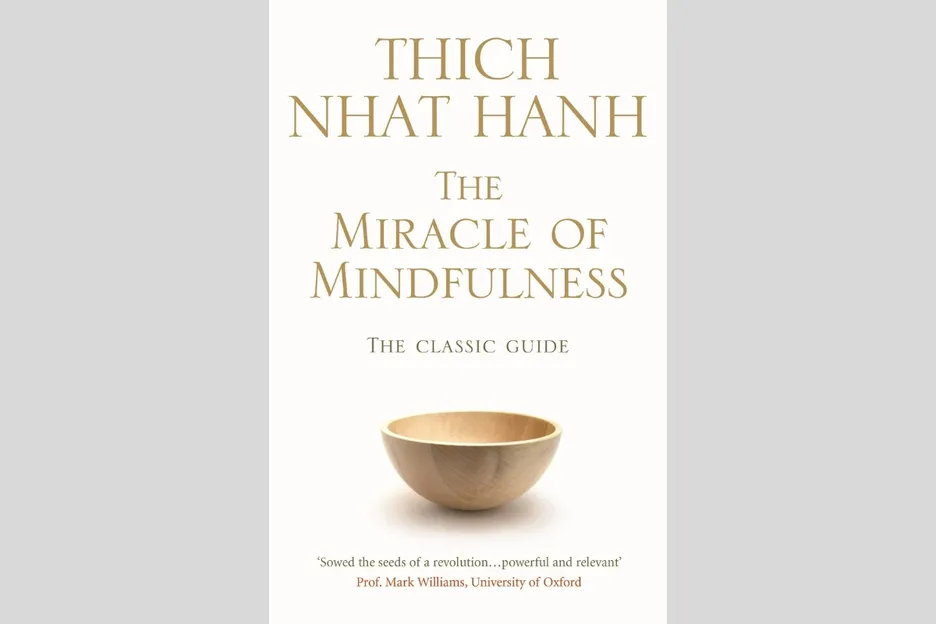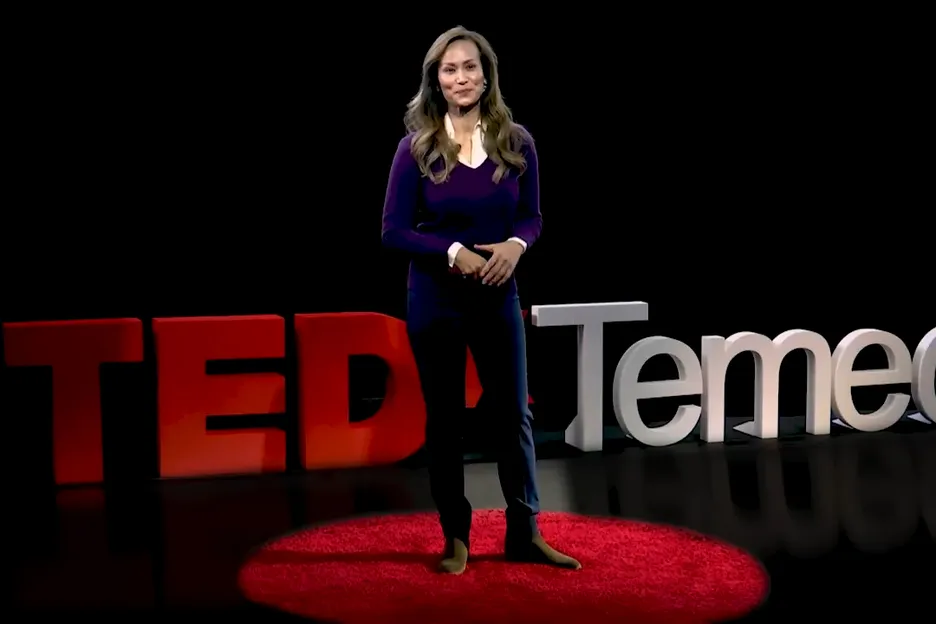When I first began playing poker seriously, I thought the game was about control of cards, chips, opponents, and outcomes. The sharper my focus, the better I could manage everything around me.
But over time — not through a final table or a trophy — I realized that the greatest opponent was my own mind.
That realization began with a teacher. Not a poker coach, but a Zen master.
This is the book that taught me to find stillness in the storm, transforming not just my poker game, but my mind, my balance, and my understanding of what it means to compete with compassion.
‘The real competition isn’t across the table — it is within’
I was blessed to study with the late Thích Nhất Hạnh, the Vietnamese monk, poet, and peace activist often called the father of mindfulness in the West. His teachings revealed a new form of mastery; one rooted not in domination or control, but in awareness and compassion.

Thích Nhất Hạnh (center) in Vietnam, 2007.
His book, The Miracle of Mindfulness, became my compass. It was not merely a guide to meditation but an invitation to live more deeply — to experience awareness as a daily practice. Thầy, as his students lovingly call him, taught that the simple act of breathing, washing dishes, or walking could reveal the same truths as hours of study or strategy at the poker table.
‘In mindfulness, one is not only restful and happy, but alert and awake. Meditation is not evasion; it is a serene encounter with reality.’
Those lines changed how I saw both life and poker. Mindfulness was not about escaping stress — it was about meeting reality with presence. Poker, like life, does not reward avoidance; it rewards awareness.
‘Breath is the bridge which connects life to consciousness’
That bridge saved me countless times. When emotions surged — after a bad beat, a bluff gone wrong, or the mounting pressure of late-stage play — I returned to my breath. Each inhale anchored me to the present; each exhale released what I could not control. In that rhythm, tilt dissolved into clarity.
Before mindfulness, I saw tilt as an enemy to conquer. After mindfulness, I saw it as a messenger. Every surge of frustration or flash of ego became information — a signal asking to be met with awareness rather than judgment.
Thầy also wrote:
‘Feelings, whether of compassion or irritation, should be welcomed, recognized, and treated on an absolutely equal basis; because both are ourselves.’
This softened my inner conflict. Instead of labeling emotions as good or bad, I began to welcome them as part of the whole. At the poker table, that awareness became my greatest edge.
He also reminds us:
‘The present moment is the only time over which we have dominion.’
In poker — and in life — so much lies beyond our control: the cards, the opponents, the variance of chance. But we always have dominion over one thing: our presence.

The book was first published in 1975.
‘Don’t do any task in order to get it over with’
At the table, that meant playing each hand not to get through it, but to inhabit it. To be one with the game as it unfolded. When I approached poker this way, my play grew more fluid, intuitive — and paradoxically, more successful.
Mindfulness has since rippled through every part of my life. It reshaped how I play, lead, and live. As founder of Poker League of Nations, I have seen how awareness transforms culture. When women sit down not only to compete but to connect, the entire table shifts. Aggression balances with empathy; silence becomes focus; and victory, redefined, becomes growth for all.
Thầy also taught that mindfulness goes beyond the self:
‘When you are mindful, you are fully alive, fully present… you can recognize, embrace, and handle the pain, the sorrow in and around you.’
Poker inevitably brings suffering — bad beats, ego, loss — but mindfulness transforms it. The sting of defeat becomes humility; the humility of loss becomes compassion. The game, once an arena of conflict, becomes a field of practice.

The book that taught me to find stillness in the storm.
‘If you are a poet, you will see clearly that there is a cloud floating in this sheet of paper’
That is Thầy’s description of interbeing — the understanding that all things exist in relationship. In the same way, no poker hand stands alone. Every decision, every player, every moment of awareness is interdependent, part of a larger web of influence. To play mindfully is to recognize that truth: that we are constantly shaping one another.
He also wrote:
‘The present moment is filled with joy and happiness. If you are attentive, you will see it.’
That simple line has become my compass. Whether I am facing a bad beat or celebrating a win, I return to the miracle of this moment — the only one that is real.
In my 2021 TEDx talk, ‘A Sport for the Mind: Why Poker Is Good for You and Your Brain,’ I spoke about this same bridge between competition and consciousness. I described how Tibetan monks create mandalas as a form of meditation, intricate designs later brushed away in silence. Poker, I realized, is not so different. Each hand, like each grain of sand, is impermanent. We play, we learn, we release, and we begin again.

The Tedx Temecula talk is available now on YouTube.
That understanding inspired my first book, The Poker Powered Brain, which explored poker as mental training; a way to strengthen focus, decision-making, and emotional balance. My upcoming book, The Mindful Competitor: Where the Game Meets Awakening — inspired by my studies with Thích Nhất Hạnh and His Holiness the Dalai Lama — continues that exploration, featuring reflections from Tommy Angelo, Daniel Cates, Jeff Madsen, and Andrew Lichtenberger on how awareness, compassion, and presence transform performance and life.
The Miracle of Mindfulness did more than improve my game; it reshaped my life. It taught me that mastery is not domination, but awareness. Success is not control, but presence. And winning is not the absence of loss, but the fullness of being alive.
At the poker table and beyond, I try to touch that miracle — one mindful hand at a time.
Lena Evans is a two-time World Series of Poker Circuit champion and philanthropist. She is the founder of Poker League of Nations — an organization dedicated to empowering women through the game — and CEO of Helix Poker and Suited Poker Gear.
Her first book, The Poker Powered Brain, debuted as a #1 Amazon New Release in psychology and creativity. Guided by the teachings of Thích Nhất Hạnh and His Holiness the Dalai Lama, her upcoming book, The Mindful Competitor: Where the Game Meets Awakening — with contributions from Tommy Angelo, Daniel Cates, Jeff Madsen, and Andrew Lichtenberger — explores how poker becomes a practice of awareness, compassion, and resilience, both at the table and beyond.

